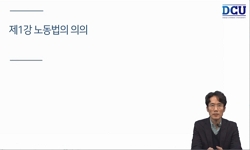Social welfare facilities, which play an important role in carrying out social services in South Korea are only ‘facilities’ rather than independent corporate entities under the Social Welfare Services Act, while there are separate operators of so...
http://chineseinput.net/에서 pinyin(병음)방식으로 중국어를 변환할 수 있습니다.
변환된 중국어를 복사하여 사용하시면 됩니다.
- 中文 을 입력하시려면 zhongwen을 입력하시고 space를누르시면됩니다.
- 北京 을 입력하시려면 beijing을 입력하시고 space를 누르시면 됩니다.

사회복지시설 종사자의 사용자는 누구인가? - 사회복지시설 설치・운영 법인의 사용자성에 관한 고찰 - = Who Employs of the Employees in Social Welfare Facilities? - A Study on the Responsibilities of Corporations Operating Social Welfare Facilities under the Labor Contract for Employees in the Facilities -
한글로보기부가정보
다국어 초록 (Multilingual Abstract)
Social welfare facilities, which play an important role in carrying out social services in South Korea are only ‘facilities’ rather than independent corporate entities under the Social Welfare Services Act, while there are separate operators of social welfare facilities. Both individuals and corporations can be operators of social welfare facilities, but in general, corporations establish and operate social welfare facilities. However, in practice, social welfare facilities perform social services with some degree of independence, and the directors of social welfare facilities often exercise discretion in managing and supervising social services carried out by the facilities. Employment-related matters of social welfare facility workers are often handled by the director, rather than the operator of the social welfare facility, and labor contracts of social welfare facility workers are often concluded in the name of the director of the facility. This type of work practice makes it difficult to clarify the legal rights and obligations by specifying the parties when social welfare facility workers claim rights under the Labor Standards Act or when legal disputes related to the Labor Standards Act occur.
This study examines legal issues related to the conclusion of labor contracts of workers in social welfare facilities. It confirms that the ‘business owner’ who works in social welfare facilities is the installation and operator of social welfare facilities, not the head of social welfare facilities. To this end, the status of workers in social welfare facilities signing labor contracts is analyzed first, followed by a review of the legal status of social welfare facility installers and operators in these labor contracts (that is, the status of ‘business owners’ under the Labor Standards Act). In particular, since there is a large proportion of facility workers signing labor contracts with facility heads, in such cases, the legal status of social welfare facility installers and operators in the labor contract and the effect of the labor contract are also examined. Finally, issues relating to the business ownership are reviewed, since the ‘business owner’ of social welfare facilities means that social welfare facility installers and operators have rights and obligations under the labor relations legislation, which includes the Labor Standards Act and the Trade Union and Labor Relations Adjustment Act, etc. Therefore, if a social welfare facility installer or operator becomes a ‘business owner’ under the Labor Standards Act and actively intervenes in employment relations, problems such as open recruitment and the possibility of unfair personnel intervention for social welfare facility workers may arise. In discussing these issues, this article calls for alignment of labor relations of social facility workers under labor law.
국문 초록 (Abstract)
우리 사회에서 사회복지사업을 수행하는 중요한 역할을 하는 사회복지시설은 「사회복지사업법」상으로는 독립된 법인격을 가진 사업주체가 아닌 ‘시설’일 뿐이며, 사회복지시설의 운...
우리 사회에서 사회복지사업을 수행하는 중요한 역할을 하는 사회복지시설은 「사회복지사업법」상으로는 독립된 법인격을 가진 사업주체가 아닌 ‘시설’일 뿐이며, 사회복지시설의 운영자는 따로 존재한다. 개인과 법인 모두 사회복지시설의 운영자가 될 수 있으나, 대체로 법인이 사회복지시설을 설치・운영하고 있다. 그러나 실무적으로는 사회복지시설이 어느 정도 독립성을 가지고 사회복지사업을 수행하며, 사회복지시설의 장이 시설 운영에 재량권을 가지고 시설이 수행하는 사업을 관리・감독하는 경우가 많다. 사회복지시설 종사자의 고용관련 업무 또한 사회복지시설의 설치・운영자가 아닌 시설장이 처리하는 경우가 많으며, 사회복지시설 종사자의 근로계약도 시설장 명의로 체결하는 경우가 많다. 이러한 방식의 업무처리는 사회복지시설 종사자가 「근로기준법」상 권리를 주장하거나 「근로기준법」 관련 법적 분쟁이 발생하는 경우 당사자를 특정하여 법적 권리・의무 관계를 명확히 하는데 어려움을 준다.
본 연구는 사회복지시설 종사자의 근로계약 체결과 관련된 법적 쟁점을 검토함으로써 사회복지시설에서 근로하는 종사자의 근로계약 상대방인 ‘사업주’는 사회복지시설의 시설장이 아니라 사회복지시설의 설치・운영자임을 확인하여 「근로기준법」상 책임의 소재를 분명히 함으로써 사회복지시설 종사자의 노동권 보장을 강화하고자 한다. 이를 위해 사회복지시설 종사자의 근로계약 체결 실태를 먼저 분석하고, 사회복지시설 설치・운영자의 근로계약상 법적 지위, 즉 「근로기준법」상 ‘사업주’ 지위에 관하여 검토한다. 특히 시설 종사자가 시설장과 근로계약을 체결하는 비율이 낮지 않기 때문에 이러한 경우 사회복지시설 설치・운영자의 근로계약상 법적 지위와 해당 근로계약의 효력 또한 함께 검토한다.
한편 사회복지시설 설치・운영자가 「근로기준법」상 ‘사업주’라는 것은 사회복지시설 종사자에 대한 노동관계법상 권리・의무를 갖게 된다는 것을 의미하며, 이는 구체적으로 사회복지시설 설치・운영자가 「근로기준법」을 비롯한 개별적 근로관계법이나 노동조합법을 비롯한 집단적 노사관계법상 권리・의무의 주체가 되어, 사회복지시설 종사자 등의 채용, 근로계약, 근로관계 유지 및 근로계약 해지 등 사회복지시설 종사자의 고용관계 전반에 걸쳐 사회복지시설 설치・운영자가 권리・의무를 갖는다는 것을 의미한다. 따라서 사회복지시설 설치・운영자가 「근로기준법」상 ‘사업주’가 되어 고용관계에 적극 개입할 경우 공개모집, 사회복지시설 설치・운영자의 사회복지시설 종사자에 대한 부당한 인사 개입 가능성 등의 문제가 제기될 수 있다. 이에 관련된 쟁점에 대해서도 함께 검토한다.
끝으로 이러한 사회복지시설 종사자에 대하여 「근로기준법」이 적용되는 것은 자명하며, 사회복지시설의 설치・운영자가 법인인 경우 법인이 해당 사회복지시설 종사자의 사용자인 것 또한 매우 당연하다. 그럼에도 불구하고 사회복지시설 종사자의 고용관계에서 시설장이 사용자처럼 보이게 하는 외관을 만들어내는 상황이 일어나는 것은 이에 대한 당국의 관리감독 소홀과 보건복지부가 매년 발표하는 “사회복지시설 관리안내”의 불명확한 서술에 상당부분 책임이 있다. 따라서 이를 입법적으로 해소할 필요가 있으며, 「사회복지사업...
동일학술지(권/호) 다른 논문
-
- 한국입법학회
- 장은정
- 2023
- KCI등재
-
재생의료 접근성 제고를 위한 입법방안에 대한 고찰- 일본의 사례를 중심으로 -
- 한국입법학회
- 박용숙
- 2023
- KCI등재
-
「5・18민주화운동 등에 관한 특별법」에 대한 입법평론
- 한국입법학회
- 임지봉
- 2023
- KCI등재
-
「문화산업진흥 기본법」의 법체계상 문제점과 입법적 개선방안- 「콘텐츠산업진흥법」과의 관계를 중심으로 -
- 한국입법학회
- 김지민
- 2023
- KCI등재




 eArticle
eArticle






